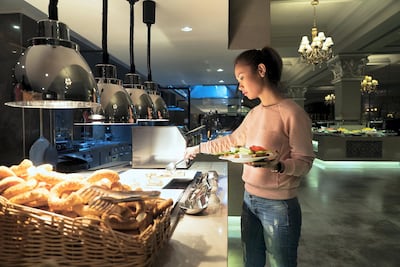Restaurants are slowly reopening their doors across the country, but, as they've done so, there has been a notable omission from the dining scene.
Buffets – long considered a staple of hotel breakfasts, brunches and iftars – have been put on hold for the foreseeable future.
In fact, restaurants around the world are temporarily bidding farewell to the popular self-service meal.
"I think it's a long time before buffets come back," Dave Johnson, chief executive of Aimbridge Hospitality told Yahoo Finance. "Even with sneeze guards and things like that. I think that the times of the buffet in a hotel are long gone."
Considering Aimbridge Hospitality manages more than 1,400 hotels, including brands Hilton and Marriott, this is no minor statement.
So, could this be the end of the hotel buffet as we know it?
Kaushal Sutaria, managing director of MyEasyIso, a health and safety company in the food sector, believes it could be – at least for now.
The main factor behind it, is that food items sitting out on a buffet table are far more exposed to outside elements, such as germs and bacteria, Sutaria says. This is especially worrisome during the Covid-19 pandemic, as the coronavirus is spread through respiratory droplets, or contact with contaminated objects and surfaces.
“All food served in this set-up is more prone to cross contamination," Sutaria explains. "Poor hygiene habits on the part of customers may also contribute to cross contamination.”
Sudqi Naddaf, executive chef at Kempinski Hotel Mall of the Emirates, agrees.
“Buffets allow guests to freely select any item available in each station," he says. "While extremely popular during Ramadan for those wanting to immerse themselves in traditional cuisine through a buffet, with a lavish selection of mezzes, main courses and dessert, there will be a lot of exposure – including falling in line at each live station and touching serving utensils while allowing food, plates and glasses to be exposed to foreign objects.”
Then there's the mass gathering aspect of buffets, as they tend to cater to large groups of people – something governments across the world are urging people to actively avoid.
Are buffets gone for good?
While it doesn’t look like the popular self-service meal is making a come back any time soon, it may be too early to write them off completely, says Sam Jones, who works as a talent acquisition specialist at food and beverage recruitment company Food People.
“While we are going through the reopening phase, the main focus is to rebuild customer confidence and ensure that we are able to dine out in a safe environment,” he says.
“I don’t think we have seen the end of buffets, as they are essential to the way businesses operate, but I think we will see vast changes. Particularly with the brunch models we have here, there is no doubt that buffets will be back in one way or another – but I think they will be rather different than what we knew them as before.”
Some major changes we can expect to see in the future, according to Jones, are a la carte breakfasts at hotels or “manned buffets”, where food is laid out but a member of staff serves the food instead of the customer.
Another variation may be table-service buffets, which is similar to a la carte, as the food is brought to your table to be laid out, which ensures the food is fresh and can be enjoyed while customers are social distancing.
“With regards to brunches, these are obviously a large part of the market and part of the attraction is having some fantastic displays of food for all to see," Jones adds. "In the short term it will be a huge hit not being able to operate these events, but in the longer run it allows for more innovation.
"Restaurants that are able to create the same atmosphere and customer engagement will thrive. There will need to be some creative thinking and I am sure we will see some really innovative ideas of serving food."
In the meantime, be wary
When, and if, buffets do launch again, experts recommend taking certain precautions.
“Check if they are following regulations to avoid the spread of the virus and make sure meals, dishes and cutlery are being treated with care,” says Naddaf.
Meanwhile, Sutaria recommends wearing face masks, washing hands before and after dining out, wearing hand gloves and keeping hand sanitiser on you.
Finally, Jones suggests customers simply be more thoughtful towards others while dining at buffets. That can be as simple as only taking as much food as you need (to reduce wastage), and practicing social distancing.
“A crowded space and leaning over each other to grab bits of food can make it a stressful time for others," he says. "Let’s be considerate to improve everyone’s experience."




